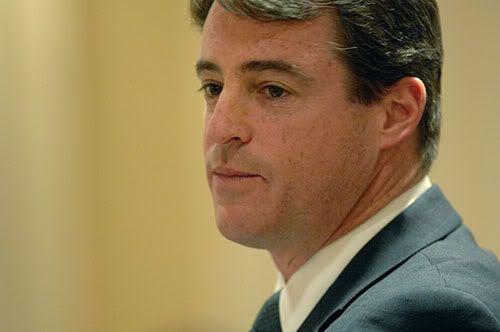By Laura Smitherman | Sun reporter
February 15, 2008
Attorney General Douglas F. Gansler has become the most prominent official in Maryland to endorse gay marriage, telling state legislators yesterday that he believes the current ban on same-sex unions amounts to discrimination.
"It would be hard for me to have this job knowing there is something so wrong in our society," Gansler told the Senate panel considering a bill to legalize gay marriage. "I just think it's wrong to discriminate against any people because they think differently or because of their sexual orientation."
But Gansler also said that lawmakers in Annapolis might not have the "political courage" to legalize gay marriage this year and that the General Assembly will probably "settle" for civil unions, which would confer many of the rights afforded to married heterosexual couples.
Gansler joined a steady march of lawmakers, clergy, concerned citizens, activists, children of gay parents and others who testified on both sides of the issue over several hours before the Senate Judicial Proceedings Committee. The panel is also considering a bill to put a constitutional amendment outlawing same-sex marriage on the November ballot, and a bill that would create domestic partnerships in place of civil marriage, a possible vehicle for civil unions.
Gay-rights activists have made passage of same-sex marriage a priority this year after Maryland's highest court upheld last year a 34-year-old state statute defining marriage as between a man and a woman. Gansler's office defended the law in that case, and yesterday he said the court made the right decision based on the law as it is written. He said that law should be changed by the legislature.
Opponents argued that gay marriage would tear at the fabric of society and force public schools to teach approval for same-sex unions. They suggested that voters should decide the issue through a constitutional amendment. Twenty-seven states have constitutional provisions that prevent same-sex marriages, though Maryland does not.
"The issue keeps coming up again and again and again," said Sen. Janet Greenip, an Anne Arundel County Republican and sponsor of the constitutional measure. "Let the people decide whether we should have marriage the way we know it, or if it should be changed."
When asked about putting the legalization of same-sex marriage to voters, Gansler said such a referendum would probably lose. But, he added, "it is the job of elected officials to do what they think is right." He referred to the 1967 Supreme Court decision declaring Virginia's law against interracial marriage unconstitutional. If that law had been put to voters in that state then, he said, they likely would have supported it.
The Senate committee is not expected to vote on the legislation for several weeks; a House panel has not yet heard the bills. Lawmakers are deeply divided on the issue. Gov. Martin O'Malley supports civil unions.
The testimony yesterday was sometimes tearful, and sometimes tense. Many speakers told their personal stories.
Sen. Richard S. Madaleno Jr., who is openly gay, said that he had a church wedding with his partner, Mark, seven years ago but that under Maryland law they are "legal strangers." Madaleno, a Montgomery County Democrat, helped to craft the same-sex marriage proposal, deliberately including language that no religious institutions or clergy would be compelled to perform or recognize those marriages.
"Without marriage, we live in a state of legal limbo," Madaleno said. "Without marriage, instead of security we have fear."
According to last year's Maryland Court of Appeals opinion, 339 Maryland laws provide for benefits and rights conditioned on marital status. Only Massachusetts allows same-sex marriage. Nine other states, including Connecticut, New Jersey, New Hampshire and Vermont, offer civil unions or domestic partnerships.
Sens. Bryan W. Simonaire and Alex X. Mooney, Republicans of Anne Arundel and Frederick counties, respectively, suggested that if outlawing gay marriage were considered discriminatory, perhaps laws against polygamy could be considered unfair as well. Both lawmakers are sponsors of the constitutional ban.
Kathleen Crank, who described herself as a stay-at-home mother and wife, said she felt compelled to testify for a constitutional ban because the "homosexual lifestyle" is "devastating." She said: "Redefining marriage is an activity undertaken to the peril of our civilized society."
Others said their families would be strengthened by gay marriage.
Bernice Melov, of Takoma Park, said that she worries what would happen if her gay son or his partner, both of whom she has lived with for more than two decades, died before she did.
Melov, 89, said they could be forced to sell the home to cover inheritance taxes they would not have to pay if they were married.
"Before I leave this earth, I want to celebrate fully equal civil marriage rights in Maryland," she told the panel. "My time is short, and I'm in a hurry. Please don't make me come back another year."

Maryland Attorney General Douglas F. Gansler addresses the Maryland Senate Judicial Proceedings Committee about his support for SB290. (Sun photo by Glenn Fawcett / February 14, 2008)
http://www.baltimoresun.com/news/health/bal-md.marriage15feb15,0,434721.story



















No comments:
Post a Comment